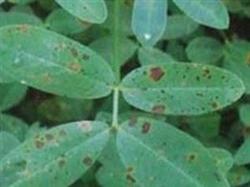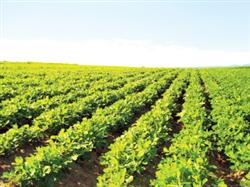Plastic Film mulching cultivation techniques of Spring Peanut

The cultivation of spring peanut covered with plastic film has the advantages of heat preservation, moisturizing, fertilizer preservation, improving the soil environment, ensuring that the seedlings are uniform and strong, promoting growth and development, maturing early and increasing production and income. Generally, the yield can be increased by 20%, 30%, and the net income per mu is increased by 50% 100 yuan. First, fine soil preparation, full-layer fertilization peanut film mulching cultivation, soil preparation needs fine, mud block must not be large, border surface should be flat. Due to the trouble of topdressing during the growth period, it is appropriate to apply sufficient base fertilizer and more organic fertilizer, which can not only grow early and quickly, but also grow steadily in the middle and later stage. After ploughing and raking, the stable manure of cattle, horse, pig and sheep was applied per mu. After ploughing and raking, the furrow was raised by 1.4 meters, the width of the border was 1.1 meters, the width of the ditch was 30 cm, and the depth of the ditch was 20 cm. The special compound fertilizer for peanuts, plant ash and borax per mu were mixed and applied to the border surface, and the planting ditches with the same depth and depth of 35 cm were opened in each border. Second, the selection of improved varieties, timely sowing, reasonable close planting all over the country should choose the best varieties to cultivate. For example, Luhua 9, Yuhua 7, Huayu 17 and other varieties can be selected in Huang-Huai-Hai Plain, with seed consumption of 15 kg per mu. The sowing date should be determined according to the local temperature rise and rainfall in early spring. Generally, when the temperature of 5 cm soil layer is stable above 12 ℃ after plastic film mulching, the seeds can be sown. Planting specifications according to plant distance of 20 cm, double kernel on demand, sowing density of 19000 kernel per mu, after sowing, the seed ditch will be spread out to cover the seed, and the border surface will be kept flat. Third, spray herbicides, cover the film carefully, and select herbicides such as 72% Dur, 50% butachlor or Acetochlor after planting in time, and evenly spray the border surface with 150 ml of water and 60 kg of water per mu. If the soil is dry, wet the border surface first, and then spray herbicides, which is conducive to the formation of a thicker film layer, and the weeding effect is better. Then spread the plastic film with a width of 1.6m and a thickness of 0.005 mm, with a dosage of 4kg per mu. The quality requirements of film mulching: first, the topsoil should be finely crushed when covering the film. The soil moisture should be sufficient (the soil water content in the surface layer of 5 cm is more than 15%), which is conducive to seed germination. Second, the film should be flattened, straightened, tightened and close to the border surface, and the edge of the border should be pressed and sealed with soil. The border surface should be pressed with a shovel of soil film every 3 meters to prevent ventilation, prevent the film from being lifted by strong wind, or even be cracked. Third, it should be suitable to the north-south border direction parallel to the wind direction. At the same time, pay attention to cleaning the drains. When peanut seedlings grow to 2.5 leaves, choose sunny days to drill holes and release seedlings in time to prevent high temperature burning seedlings. Specific methods: use a blade to cut about 5 cm of membrane holes around the seedlings, help the true leaves of the seedlings out of the membrane, and seal the edge of the membrane with soil in time. In addition, when drilling, the pore diameter should be as small as possible, so that the real leaf can protrude out of the film, so as not to reduce the heat preservation effect. Fourth, scientific drainage and irrigation, seedling control and lodging prevention, disease prevention and pest control, aiming at the characteristics of fear of soiling in the early and later stages of peanuts and drought in the middle stage, clear ditches and drainage at the seedling stage, irrigate horse water in the event of drought during the flowering and needle period, and keep the soil moist in the later stage. The growth of plastic film peanut is exuberant and the plant is tall. about 25 days after flowering, paclobutrazol is sprayed with paclobutrazol 20ml / mu and 60kg / mu with water, which can control the length and prevent lodging. The application of lime 40m / mu at the flowering stage can promote more flowers and pods and improve the fullness rate. In the aspect of pest control, carbendazim, methomyl and Keshou pesticides were sprayed after flowering to control leaf spot, rust and bacterial wilt. Aphids and Spodoptera litura were sprayed with aphid lice Jing, Lesben and other corresponding pesticides in time. Fifth, timely harvest, recovery of plastic film peanuts mature 10 days earlier than exposed peanuts, generally in mid-July, late July can be harvested and put on the market. When harvesting, it is necessary to do a good job in the recovery and treatment of plastic film, pick up the broken film and prevent soil pollution.
- Prev

The effect of plastic film mulching cultivation of spring peanut is good.
The application of plastic film mulching cultivation technology in peanut production can increase temperature, protect whole seedlings, preserve water and fertilizer, so as to achieve the purpose of increasing production and income. The author conducted a comparative experiment on plastic film mulching cultivation of spring peanut in 2002 and obtained 402 kg per mu and 367 kg per mu in the experimental plot.
- Next

The main points of cotton topdressing
The main points of cotton topdressing
Related
- The first cup of black tea in spring, the flavor and history of tea gardens in Kenya, Africa
- The computer can not only choose potatoes, but also grow tea rice. AI will grow winter oolong tea champion.
- It is not only the inflated tea bitten by insects, but also engraved with the four seasons tea in Beipu.
- The Oriental Beauty Tea Festival in Zhuxian County takes the stage at the weekend to experience the plus-size feast of oil tea.
- & quot; Oriental Beauty Tea & Exploration of Emei in Hsinchu, the hometown of quot;
- The new variety of strawberry "Tainong 1" dessert is the first choice with mellow aroma. Crimson gorgeous
- History of Tea in Taiwan: from Wild Inner Mountain to Export Tea Garden
- Two types of Taiwan Oriental Beauty Black Tea won the British three-Star Award for Childhood Tea Xiang Zhang Jiaqi changed from pilot to champion tea maker.
- Banana species and varieties: the planting history of Taiwan Xianren banana and dwarf banana is long, is banana disease resistant?
- Coffee planting Technology: Qianjie Coffee from Seedling to harvesting

